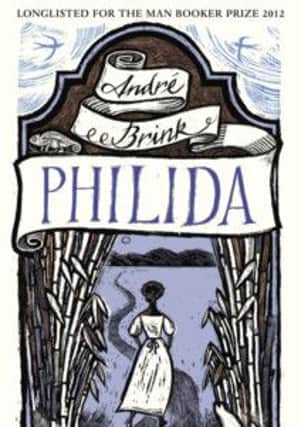Book review: Philida by André Brink


Philida was a Cape Colony ‘knitting girl’ owned by the Brinks, a family of Dutch settlers, in the early 19th century. She tells her unforgettable story in a remarkable novel which was longlisted for the Man Booker Prize last year.
Brink, a leading force in the anti-apartheid movement and one of South Africa’s best novelists, takes us on a journey – harrowing, uncomfortable but ultimately inspirational – through the life of one woman whose personal struggle embodies a nation’s battle for freedom.
Advertisement
Hide AdAdvertisement
Hide AdPhilida, Brink reveals, worked on a wine farm at Zandvliet in the Western Cape from 1824 to 1832 and the discovery that her master Cornelis Brink was a brother of one of his own direct ancestors, and that he sold her at auction after his son Francois had ‘made four children with her,’ triggered this rich and complex book.
Using a multiple narrative device, but with Philida’s voice the most compelling and dominant, Brink combines historical fact with an authentic and audacious imagining of life on both sides of the racial divide in the Cape.
The novel opens in the period leading up to the emancipation of slaves in the colony in 1834, making Philida’s experiences and courageous real-life ‘rebellion’ all the more poignant.
In 1832, the Cape is rife with rumours that the British are about to create new laws on slavery throughout their empire.
Advertisement
Hide AdAdvertisement
Hide AdAt Zandvliet, Philida, whose body has never truly been her own, is the mother of four children by Francois Brink, the son of her master. ‘I am a piece of knitting that is knitted by somebody else,’ she wryly observes.
Despite the master-slave inequalities of their relationship, Philida and Frans appear to share a deep affection for each other. But, under pressure from his financially strapped father Cornelis, Frans has been ordered to marry a white woman from a wealthy local family and reneged on his promise to set Philida free.
Instead, Philida and her children will be sold to new owners in the harsh ‘interior’ country in the north.
Unwilling to accept her fate, Philida tests the limits of her freedom by setting off on a momentous journey – with her baby strapped to her back – across the great wilderness to the far north of Cape Town where she plans to level a charge against Frans.
Advertisement
Hide AdAdvertisement
Hide AdAware that slave protectors are now operating from the Drostdy, the South African seat of justice in Stellenbosch, Philida plans to accuse Frans over his broken promises, and to win both a means of survival and her liberation.
It’s a huge risk because if her plea fails, slaves who return to their masters face the possibility of being beaten to death, hung upside down or starved to death and, as it turns out, Philida’s appeal to the Slave Protector is two years too early.
However, her act of breathtaking defiance is just the precursor of events that will change forever the dynamics of life in South Africa.
Brink allows us to see beyond the limited, early horizons of Philida and the family whose land and fortunes were built on the ‘sweat and blood’ of their slaves, and into more fertile territory where a ‘Rainbow Nation’ allows all to prosper, whatever their colour or creed.
Advertisement
Hide AdAdvertisement
Hide AdEven-handed in its evocation of both sides of the racial divide and packed with powerful language and subtle motifs, Philida is a moving, memorable story of courage, endurance... and hope.
(Vintage, paperback, £8.99)